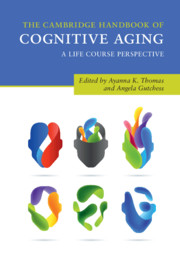Book contents
- The Cambridge Handbook of Cognitive Aging
- The Cambridge Handbook of Cognitive Aging
- Copyright page
- Contents
- Figures
- Tables
- Contributors
- Introduction
- Part I Models of Cognitive Aging
- 1 Overview of Models of Cognitive Aging
- 2 Cognitive Reserve
- 3 How Age-Related Changes in the Brain Affect Cognition
- 4 Neuroadaptive Trajectories of Healthy Mindspan: From Genes to Neural Networks
- 5 Cognitive Aging: The Role of Neurotransmitter Systems
- 6 How Arousal-Related Neurotransmitter Systems Compensate for Age-Related Decline
- Part I Summary: Models of Cognitive Aging
- Part II Mechanisms of Cognitive Aging
- Part III Aging in a Socioemotional Context
- Part IV Cognitive, Social, and Biological Factors across the Lifespan
- Part V Later Life and Interventions
- Index
- Plate Section (PDF Only)
- References
1 - Overview of Models of Cognitive Aging
from Part I - Models of Cognitive Aging
Published online by Cambridge University Press: 28 May 2020
- The Cambridge Handbook of Cognitive Aging
- The Cambridge Handbook of Cognitive Aging
- Copyright page
- Contents
- Figures
- Tables
- Contributors
- Introduction
- Part I Models of Cognitive Aging
- 1 Overview of Models of Cognitive Aging
- 2 Cognitive Reserve
- 3 How Age-Related Changes in the Brain Affect Cognition
- 4 Neuroadaptive Trajectories of Healthy Mindspan: From Genes to Neural Networks
- 5 Cognitive Aging: The Role of Neurotransmitter Systems
- 6 How Arousal-Related Neurotransmitter Systems Compensate for Age-Related Decline
- Part I Summary: Models of Cognitive Aging
- Part II Mechanisms of Cognitive Aging
- Part III Aging in a Socioemotional Context
- Part IV Cognitive, Social, and Biological Factors across the Lifespan
- Part V Later Life and Interventions
- Index
- Plate Section (PDF Only)
- References
Summary
This chapter reviews major theories of cognitive aging. Theories such as the sensory deficit hypothesis, speed of processing, and inhibitory deficit hypothesis are based largely on behavioral findings and focus on a single process that is purported to account for a number of cognitive changes with age. Specific to memory, theories focus on age deficits in recollection and binding. Over the past twenty-five years, brain-based models have begun to pervade the literature. These have focused on concepts such as compensation, dedifferentiation, and suppression of the default mode network. The scaffolding theory of aging and cognition integrates many of these concepts into a single comprehensive model, including consideration of enrichment and depletion factors that operate over the life span. We conclude the chapter with some debates, critiques, and consideration of future directions, particularly considering the contributions of cognitive neuroscience methods.
Keywords
- Type
- Chapter
- Information
- The Cambridge Handbook of Cognitive AgingA Life Course Perspective, pp. 5 - 31Publisher: Cambridge University PressPrint publication year: 2020
References
- 3
- Cited by

